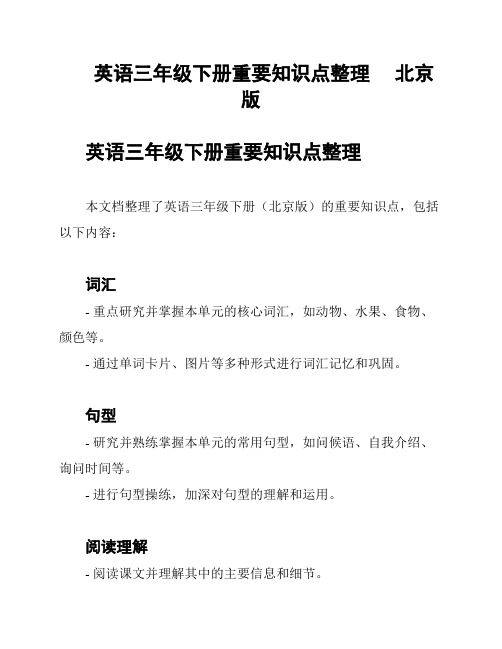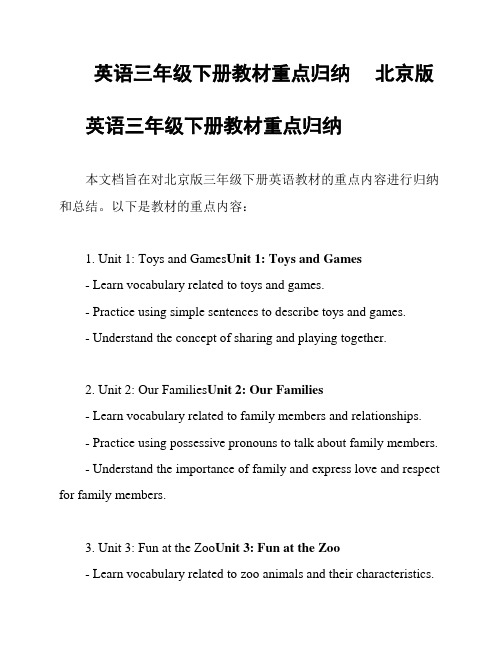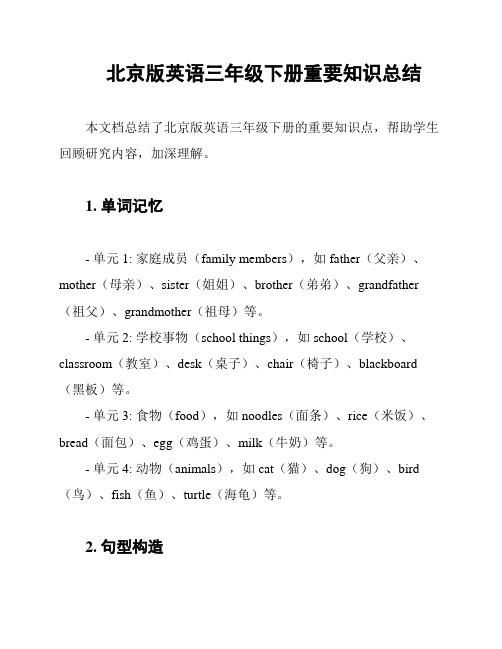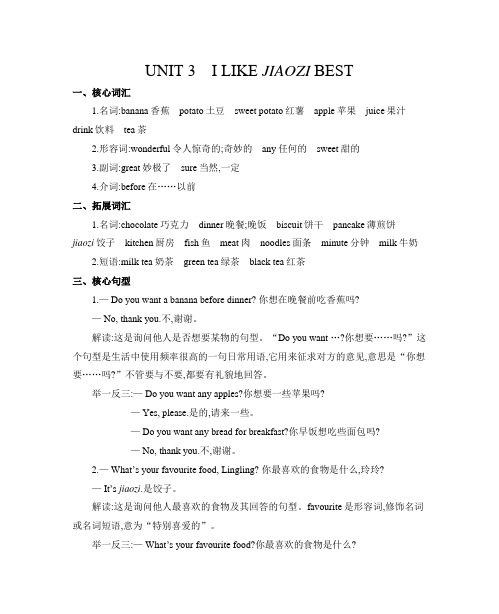北京版小学英语三年级下册单元重点
英语三年级下册重要知识点整理 北京版

英语三年级下册重要知识点整理北京
版
英语三年级下册重要知识点整理
本文档整理了英语三年级下册(北京版)的重要知识点,包括以下内容:
词汇
- 重点研究并掌握本单元的核心词汇,如动物、水果、食物、颜色等。
- 通过单词卡片、图片等多种形式进行词汇记忆和巩固。
句型
- 研究并熟练掌握本单元的常用句型,如问候语、自我介绍、询问时间等。
- 进行句型操练,加深对句型的理解和运用。
阅读理解
- 阅读课文并理解其中的主要信息和细节。
- 进行相关的阅读理解题目练,提高阅读能力和理解水平。
口语交际
- 练在真实场景下运用所学知识进行口语交流,如询问个人信息、描述事物等。
- 进行角色扮演练,提高口语表达能力。
写作
- 研究书写英文单词和简单句子,提高书写准确性和规范性。
- 通过简单的题目和图片写作训练,培养写作能力。
听力
- 听取录音并理解所听内容,包括常用的问候语、数字、颜色、时间等。
- 进行相关的听力练,提高听力理解和辨音能力。
语法
- 研究本单元的基本语法知识,如动词的时态、名词的单复数、形容词的比较等。
- 进行相关的语法练,加深对语法知识的掌握和运用。
以上是英语三年级下册(北京版)的重要知识点整理。
通过系统的学习和练习,相信学生们能够更好地掌握英语知识,提高英语能力。
英语三年级下册教材重点归纳 北京版

英语三年级下册教材重点归纳北京版英语三年级下册教材重点归纳本文档旨在对北京版三年级下册英语教材的重点内容进行归纳和总结。
以下是教材的重点内容:1. Unit 1: Toys and Games Unit 1: Toys and Games- Learn vocabulary related to toys and games.- Practice using simple sentences to describe toys and games.- Understand the concept of sharing and playing together.2. Unit 2: Our Families Unit 2: Our Families- Learn vocabulary related to family members and relationships.- Practice using possessive pronouns to talk about family members.- Understand the importance of family and express love and respect for family members.3. Unit 3: Fun at the Zoo Unit 3: Fun at the Zoo- Learn vocabulary related to zoo animals and their characteristics.- Practice using adjectives to describe animals.- Understand the importance of protecting and caring for animals.4. Unit 4: Food and Drinks Unit 4: Food and Drinks- Learn vocabulary related to food and drinks.- Practice using countable and uncountable nouns to talk about food.- Understand the importance of healthy eating habits.5. Unit 5: Clothes Unit 5: Clothes- Learn vocabulary related to clothes and colors.- Practice using simple sentences to describe clothes.- Understand the importance of dressing appropriately for different occasions.以上是英语三年级下册教材的重点内容归纳。
北京版英语三年级下册重要知识总结

北京版英语三年级下册重要知识总结本文档总结了北京版英语三年级下册的重要知识点,帮助学生回顾研究内容,加深理解。
1. 单词记忆- 单元1: 家庭成员(family members),如father(父亲)、mother(母亲)、sister(姐姐)、brother(弟弟)、grandfather (祖父)、grandmother(祖母)等。
- 单元2: 学校事物(school things),如school(学校)、classroom(教室)、desk(桌子)、chair(椅子)、blackboard (黑板)等。
- 单元3: 食物(food),如noodles(面条)、rice(米饭)、bread(面包)、egg(鸡蛋)、milk(牛奶)等。
- 单元4: 动物(animals),如cat(猫)、dog(狗)、bird (鸟)、fish(鱼)、turtle(海龟)等。
2. 句型构造- 单元1: "Whose...is this?"(这是谁的......?),用于询问物品的所有者,如"Whose bag is this?"(这是谁的书包?)、"Whose pencil is this?"(这是谁的铅笔?)等。
- 单元2: "There is/are..."(有......),用于描述存在的物品或人,如"There is a book on the desk."(桌子上有一本书。
)、"There are two apples in the basket."(篮子里有两个苹果。
)等。
- 单元3: "I like..."(我喜欢......),用于表达喜欢的物品或活动,如"I like noodles."(我喜欢吃面条。
)、"I like playing soccer."(我喜欢踢足球。
英语三年级下册单元知识点梳理北京版

英语三年级下册单元知识点梳理北京版英语三年级下册单元知识点梳理(北京版)play ping-pong,play baske t ball,go ice-skating,fly a kite, plant trees,make a cake,see the monkey at the zoo, make a card, trees,turn green, butterfly, dance, bear, wake up -What are you going t o do this -What d o you see in spring?-I see a triangle.sweet, potatoes, noodles, fish, a cup of milk tea,a cup of green tea,[来源学§科§网Z§X§X§K]a cup of black tea,meat ball, biscuit, pancake, jiaozi,-Do you want a banana?-Yes, please. / No, thank you.-What’s your favourite food?-It’s jiaozi.-May I h ave a cup of milk te a, please?go to the cinema, go for lunch, dance,play the piano, read the story books, go to the bookstore,do magic tricks,play the drum,-So do I.一般将来时(will)例:What will you do?I will play the piano.[来源:Z|xx|/doc/c47709126.html,]drive us there, make a card, play a game, listen to music, open the gift, go swimming, have some ice creamkiss sb.give sb. a big hug,-Will Dad drive us there?-Yes, he will.-What are you doing?-I am making a card.-Can I open the gift now?-Please do. / Please don’t.[a?]ou: mouse, proud, outow:owl, now, town一般将来时(will)例:Will dad drive us there?Yes, he will.正在进行时be + doing例:Wha t are you doing?I’m making a card.singer, football player, teacher, -What do you want to do?[a??]询问志向例:What do you want to be?I want to be a writer.。
北京版小学英语三年级下册重点词语汇总

北京版小学英语三年级下册重点词语汇总北京版小学英语三年级下册重点单词汇总动物类:cat猫XXX猴子bear熊butterfly蝴蝶bird鸟tiger虎cow奶牛dog狗fox狐狸颜色类:red红white白blue蓝yellow黄black黑pink粉green绿形状类:shape形状circle圆形rectangle长方形triangle三角形star星形XXX正方形形容词类:long长——short短big大——small小old老的——young年轻的物品类:ship轮船bag书包flag旗pen钢笔duck鸭子watch手表bus公交车house房子clock闹钟1box盒子eraser橡皮cup茶杯glass水杯waterbottle水壶pencilcase铅笔盒football足球book书raincoat雨衣gift礼物card卡片kite风筝party聚会pencil 铅笔食物类:rice米饭jiaozi饺子fish鱼肉meatball肉丸chicken鸡肉hot dog热狗noodles面条biscuits饼干sweet potato红薯pancake煎饼,烙饼chocolate巧克力meat肉pizza披萨饮品类:black tea红茶green tea绿茶milk tea奶茶tea茶water水juice果汁ice cream冰淇淋水果类:banana香蕉apple苹果orange橘子grapes葡萄pear梨职业类:XXX跳舞演员doctor大夫XXX牙医nurse护士worker工人XXX作家singer歌手cook厨师XXX科学家XXX将XXX差人player活带动XXX教师XXX救火员北京版小学英语三年级下册重点单词汇总人称类:XXX叔叔XXX阿姨XXX母亲XXX父亲XXX 奶奶(姥姥)XXX爷爷(姥爷)he他she她we我们they他们XXX你,你们场所类:XXXXXX厨房2【看图选短语题所涉及的所有短语】play ping-pong打乒乓球play basketball打篮球go ice-skating去滑冰fly a kite放鹞子plant trees种树make a cake制造蛋糕make a gift制造礼品make a card制造贺卡make jiaozi 捏饺子make apple juice榨苹果汁have a ic野餐draw pictures画画go to the bookstore去书店go for XXX外出用饭play the piano弹钢琴play the drum打鼓do magic tricks变把戏sing songs and XXX唱歌、跳舞have a party举行集会play a game打游戏listen to music听音乐go home回家have some ice cream吃冰淇淋open the gift翻开礼品go swimming去泅水write stories写故事kiss mum亲吻妈妈give mum a big hug拥抱妈妈Father’s Day父亲节Mother’s Day母亲节。
北京版 英语3年级下册 Unit 3 知识清单

UNIT 3I LIKE JIAOZI BEST一、核心词汇1.名词:banana香蕉potato土豆sweet potato红薯apple苹果juice果汁drink饮料tea茶2.形容词:wonderful令人惊奇的;奇妙的any任何的sweet甜的3.副词:great妙极了sure当然,一定4.介词:before在……以前二、拓展词汇1.名词:chocolate巧克力dinner晚餐;晚饭biscuit饼干pancake薄煎饼jiaozi饺子kitchen厨房fish鱼meat肉noodles面条minute分钟milk牛奶2.短语:milk tea奶茶green tea绿茶black tea红茶三、核心句型1.— Do you want a banana before dinner? 你想在晚餐前吃香蕉吗?— No, thank you.不,谢谢。
解读:这是询问他人是否想要某物的句型。
“Do you want …?你想要……吗?”这个句型是生活中使用频率很高的一句日常用语,它用来征求对方的意见,意思是“你想要……吗?”不管要与不要,都要有礼貌地回答。
举一反三:— Do you want any apples?你想要一些苹果吗?— Yes, please.是的,请来一些。
— Do you want any bread for breakfast?你早饭想吃些面包吗?— No, thank you.不,谢谢。
2.— What’s your favourite food, Lingling? 你最喜欢的食物是什么,玲玲?— It’s jiaozi.是饺子。
解读:这是询问他人最喜欢的食物及其回答的句型。
favourite是形容词,修饰名词或名词短语,意为“特别喜爱的”。
举一反三:— What’s your favourite food?你最喜欢的食物是什么?— It’s fish.是鱼肉。
— What’s your favourite food?你最喜欢的食物是什么?— It’s bread.是面包。
英语北京版三年级下知识点

英语北京版三年级下知识点英语作为一门语言学科,对于三年级的学生来说,是学习语言的黄金时期,他们对语言的接受能力和模仿能力都非常强。
北京版英语教材注重培养学生的基础语言能力,以下是三年级下学期的一些重要知识点:一、字母和发音- 掌握26个英文字母的大小写形式。
- 学习字母的自然拼读法,能够根据字母的发音规则拼读简单的单词。
二、基础词汇- 学习与日常生活相关的词汇,如家庭成员、颜色、数字、动物、食物等。
- 能够正确使用这些词汇进行简单的自我介绍和描述。
三、简单句型- 学习基本的句型结构,如主语+谓语+宾语。
- 掌握一般现在时的用法,能够用简单的句型表达日常活动。
四、日常对话- 学习日常交流中的基本对话,如问候、告别、询问和回答等。
- 能够使用简单的英语进行基本的社交活动。
五、阅读和理解- 阅读简单的英语小故事或短文,理解故事的主要内容。
- 学习通过图片和上下文来猜测生词的意思。
六、听力训练- 通过听英语歌曲、故事和对话来提高听力理解能力。
- 学习识别不同的语音和语调。
七、书写练习- 练习书写英语字母和单词,注意字母的大小写和单词的拼写。
- 学习书写简单的句子和短文。
八、语法基础- 学习一些基本的语法规则,如名词的单复数形式、动词的时态变化等。
- 能够在句子中正确使用这些语法规则。
九、文化知识- 了解一些英语国家的文化习俗和节日。
- 学习用英语介绍自己的文化背景。
十、复习和巩固- 定期复习所学知识,通过练习题和测试来巩固学习成果。
- 参与小组活动和角色扮演,提高实际应用能力。
通过这些知识点的学习,学生不仅能够打下坚实的英语基础,还能培养对英语学习的兴趣和热情。
教师和家长应鼓励学生积极参与课堂活动,多听、多说、多读、多写,以提高他们的英语语言技能。
新北京课改版三年级下册小学英语全册单元知识点小结

新北京课改版三年级下册小学英语期末复习(全册单元知识点小结)UNIT SPRING IS HERE一、核心词汇1.名词:woman(pl.women)女人;妇女people人们bird鸟2.动词:plant栽种turn变得;成为hear听见;听3.形容词:fun有趣的favourite特别喜爱的4.副词:tomorrow明天out外面的二、拓展词汇1.名词:ping-pong乒乓gift礼物March三月kite风筝basketball篮球afternoon下午;午后tree树木April四月morning早晨;上午card卡片monkey 猴子zoo动物园evening傍晚;晚上outing郊游;远足;外出spring春天season 季节grass草;草坪bear熊butterfly蝴蝶2.动词:play踢;打make制作join加入see看见;看到sing唱;歌唱wake醒来;唤醒dance跳舞3.形容词:colourful丰富多彩的bright明亮的三、核心句型1.Can you play ping-pong with me? 你能和我一起打乒乓球吗?解读:此句是询问他人能否一起做某事的句型,是一般疑问句。
举一反三:Can you play with me?你能和我一起玩吗?Can you stay with me?你能和我待在一起吗?Can you go out with me?你能和我一起出去吗?2.— What are you going to do this afternoon, Lingling? 今天下午你打算做什么,玲玲?— We are going to plant trees.我们要植树。
解读:此句是询问他人计划或打算的常见句型,是一般将来时,后面常接表示将来的时间状语。
举一反三:— What are you going to do this summer holiday?这个暑假你打算做什么?— I’m going to visit my uncle.我打算去拜访我叔叔。
- 1、下载文档前请自行甄别文档内容的完整性,平台不提供额外的编辑、内容补充、找答案等附加服务。
- 2、"仅部分预览"的文档,不可在线预览部分如存在完整性等问题,可反馈申请退款(可完整预览的文档不适用该条件!)。
- 3、如文档侵犯您的权益,请联系客服反馈,我们会尽快为您处理(人工客服工作时间:9:00-18:30)。
.UNIT ONESPRING IS HERE一、功能句要求:1. 下列句子要求能听懂、会说、能认读,能根据情景或实际情况替换划线部分;2. 带“★”的句子要求会写,能根据情景或实际情况替换划线部分。
1. Can you play ping-pong with me? Yes, let’s go.2. Can you fly a kite with me?I’m sorry I can’t.3. What are you going to do this afternoon? We are going to plant trees.I am going to plant a tree. ★4. What do you see in spring?The trees turn green.5. Grass comes out.6. Butterflies dance.7. Bears wake up.8. Birds sing. ★二、单词与词组(听、说、读)(带“★”的单词或词组要求会拼写)1. make a gift ★2. play ping-pong3. play basketball4. go ice-skating5. fly a kite ★6. Women’s Day7. Tree-planting Day8. plant trees9. make a cake10. see the monkeys at the zoo 11. make a card12. plant a tree ★13. go for an outing14. this morning15. this afternoon16. this evening17. today三、语音词汇(听、说、读)1. ball2. tall3. small4. short5. forty6. horseUNIT TWOI LIKE THE SHAPE一、功能句要求:1. 下列句子要求能听懂、会说、能认读,能根据情景或实际情况替换划线部分;2. 带“★”的句子要求会写,能根据情景或实际情况替换划线部分。
1. How many stars are there?There are five yellow stars, one big star and four small ones.2. What’s your watch like?It’s square, and it’s black.3. What shapes do you see in the house?I see a triangle.二、单词与词组(听、说、读)(带“★”的单词或词组要求会拼写)1. star (复数stars)★2. big3. small4. pencils (复数)5. long6. short7. cats(复数).8. monkeys (复数)9. old10. young11. national flag12. rectangle (复数rectangles)13. red14. white15. blue16. black17. pink18. green19. watch20. square (复数squares )21. box ★22. round23. clock ★24. eraser25. one26. two27. four28. five29. house30. triangle (复数triangles)31. ship ★32. bus ★33. circle (复数circles )三、语音词汇(听、说、读)1. too2. pool3. school4. boot5. blue6. rudeUNIT THREEI LIKE JIAOZI BEST一、功能句要求:1. 下列句子要求能听懂、会说、能认读,能根据情景或实际情况替换划线部分;2. 带“★”的句子要求会写,能根据情景或实际情况替换划线部分。
1. Do you want a banana?Yes, please.2. Do you want some biscuits?No, thank you.3. What’s your favourite food?It’s jiaozi.★4. What’s Maomao’s favourite food? It’s noodles. ★5. May I have a cup of milk tea, please? Sure.6. May I have… for lunch?Sure.二、单词与词组(听、说、读)(带“★”的单词或词组要求会拼写)1. chocolates2. sweet potatoes3. a sweet potato4. some biscuits5. banana ★6. pancake7. jiaozi8. noodles ★9. fish ★10. meatballs11. make apple juice12. a cup of milk tea13. a cup of green tea14. a cup of black tea 一杯红茶UNIT FIVECHILDREN’S DAY一、功能句(听、说、读)要求:1. 下列句子要求能听懂、会说、能认读,能根据情景或实际情况替换划线部分;2. 带“★”的句子要求会写,能根据情景或实际情况替换划线部分。
1. Do you want to fly my new kite?Yes, I do.2. Do you want to go to the cinema? Sorry, I can’t.3. What will you do at the party?I will play the piano. ★4. What will you do on Children’s Day?I will have a party with friends.5. I like the shape.So do I.二、单词与词组(听、说、读)(带“★”的单词或词组要求会拼写)1. fly my new kite2. go to the bookstore3. go to the cinema4. go for lunch now5. go to the park ★6. play the piano ★7. dance ★8. play the drum9. do magic tricks10. sing a song ★11. go shopping with Mum12. have a party with friends13. our new teacher14. shape15. the story books16. Children’s DayUNIT SIXMOTHER’S DAY一、功能句(听、说、读)要求:1. 下列句子要求能听懂、会说、能认读,能根据情景或实际情况替换划线部分;2. 带“★”的句子要求会写,能根据情景或实际情况替换划线部分。
1. Will Dad drive us there?Yes, he will.2. Will she give her mum a big hug?Yes, she will.3. Will he kiss his mum?Yes, he will.4. What are you doing?I’m making a card. ★5. Can I open the gift now?Please do.6. Can I have some ice cream?Please don’t.二、单词与词组(听、说、读)(带“★”的单词或词组要求会拼写)1. Mothe r’s Day2. drive us there3. kiss his mum4. go to see her mum5. get gifts6. cook7. Father’s Day8. making a card ★9. playing a game (game★)10. listening to music (music★)11. open the gift ★12. have some ice cream13. go home14. go swimming with Maomao(go swimming★)三、语音词汇(听、说、读)1. out2. mouse3. shout4. cloud5. now6. cowUNIT SEVENI WANT TO BE A TEACHER一、功能句(听、说、读)要求:1. 下列句子要求能听懂、会说、能认读,能根据情景或实际情况替换划线部分;2. 带“★”的句子要求会写,能根据情景或实际情况替换划线部分。
1. What do you want to be?I want to be a singer. ★2. What does Guoguo want to be?She wants to be a dancer. ★3. What does your father do?He is a teacher. ★4. What does your mother do?She is a doctor. ★5. Will you take football lessons?Yes, I will.6. Will you take ballet lessons?No, I won’t.二、单词与词组(听、说、读)(带“★”的单词或词组要求会拼写)1. writer2. singer ★3. dancer ★4. a football player5. scientist6. swimmer7. policeman8. uncle9. aunt10. father11. mother12. nurse ★13. doctor ★14. dentist15. teacher ★16. worker17. football18. ballet19. computer20. piano21. farmer22. driver三、语音词汇(听、说、读)1. our2. hour3. sour4. flour5. flower。
